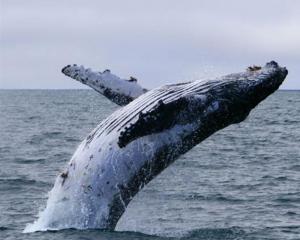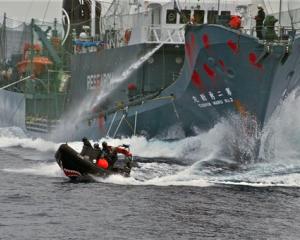It's been a long time coming but finally Australian lawyers will stand before the 16 judges of the International Court of Justice and ask them to ban Japan from harpooning whales in the Southern Ocean.
Australia puts its opening argument in The Hague on Wednesday more than six years after then opposition leader Kevin Rudd pledged that a future Labor government would take legal action against Tokyo.
Rudd was duly elected prime minister in November 2007 but it took another 18 months before Canberra instituted proceedings in mid-2010.
A few months later Rudd was deposed by Julia Gillard but Labor has pushed ahead with its case that Japan's scientific whaling programme is contrary to its international obligations under the whaling convention.
In the meantime, clashes between Japan's whaling fleet and Sea Shepherd activists have become a dramatic staple of the southern hemisphere summer when hard news is often in short supply.
Rudd knew being tough on whaling was popular with the public but he was nervous about damaging diplomatic and trade relations with Tokyo.
Which is why Attorney-General Mark Dreyfus was stressing the long-standing relationship between the two countries this week.
"Australia and Japan are friends," he said on Sunday.
"It's absolutely appropriate that that we resolve a dispute between friends in a court."
Australia is sending a team of legal experts including solicitor-general Justin Gleeson to the hearings, which will run over three weeks.
Mr Dreyfus will head to the Netherlands for the third and final week.
He pointed out on Sunday that Australia's views are well-known.
"We want commercial whaling to stop and that includes the so-called scientific whaling programme that Japan has been carrying on for many years," he said.
Australia wants the ICJ judges to order Tokyo to stop its JARPA II research program and "revoke any authorisations, permits or licences" to hunt whales in the Antarctic.
Norway and Iceland conduct commercial whaling but Japan insists its programme is purely scientific while making no secret that the resulting meat ends up on plates.
Japan killed around 6500 Antarctic minke whales between 1987 and 2005 after the International Whaling Commission's ban on commercial whaling.
That compares with only 840 whales for research purposes in the 31 years before the 1986 moratorium, court papers state.
A further 2500 minke whales were killed between 2005 and 2009 under the JARPA II program.
Although Minke whales are not endangered JARPA II also allows for the killing of endangered mammals including humpback and fin whales.
Tokyo insists that eating whale meat is a culinary tradition and it's set up a special taskforce within the foreign ministry to defend its programme at The Hague.
"Japan's research is a scientific study and legitimate under the convention," an unnamed official told AFP this week.
"We will stress that point in the oral hearings."
Fairfax has reported Japan will also challenge the ICJ's jurisdiction to hear the case.
Tokyo will reply to Australia's submission from next Tuesday.
New Zealand, which has been granted permission to intervene, will offer its anti-whaling "observations" the following Monday.
Mr Dreyfus is hopeful of a decision before the end of the year and "optimistic" Canberra will prevail.
States can't appeal ICJ decisions but the attorney-general nevertheless pointed out this week that "we'll abide by the result".






